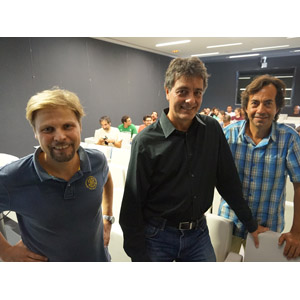Tuesday, 22 September 2015
Prof. Albert Folch: 3D printing will make microfluidic devices easily available to clinicians
Prof. Albert Folch, Associate Professor of Bioengineering at the University of Washington, presented his recent work in an ICN2 Seminar introduced by Dr. Antoni Homs. His lab's long-term mission is to make microfluidic devices easily available to clinicians in order to enable novel cancer diagnostics and therapies.

Biologists and clinicians typically do not have access to microfluidic technology because they do not have the engineering expertise or equipment required to fabricate and/or operate microfluidic devices. Furthermore, the present commercialization path for microfluidic devices is usually restricted to high-volume applications in order to recover the large investment needed to develop the plastic moulding processes. The work led by Prof. Albert Folch, Associate Professor of Bioengineering at the University of Washington, may boost the use of this technology by clinicians. He presented his recent work in an ICN2 Seminar introduced by Dr. Antoni Homs, from the ICN2 Nanobiosensors and Bioanalytical Applications (NanoB2A) Group.
Prof. Albert Folch leads a research team developing microfluidic devices through stereolithography, a form of 3D printing, in order to make microfluidic technology readily available via the web to biomedical scientists. His lab presently focuses on developing 3D-printable microdevices that facilitate the advancement of basic neuroscience and translational cancer applications. The lab's long-term mission is to make microfluidic devices as easy to use as smartphones and make them easily available to clinicians in order to enable novel cancer diagnostics and therapies.
Don't forget to take a look at the beautiful Youtube Channel of the Group.

